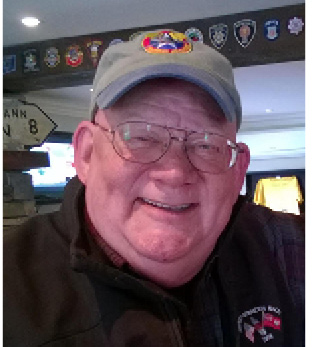 Writer, TV producer, director and videographer Greg Gilmartin is a certified US Sailing Regional Race Officer, a Mudhead to the core, and an inveterate POTRAF.
Writer, TV producer, director and videographer Greg Gilmartin is a certified US Sailing Regional Race Officer, a Mudhead to the core, and an inveterate POTRAF.
“I was born in Brooklyn, New York, lived in Sheepshead Bay next to Coney Island and spent more time on the beach than on the water,” Greg recalls. “Moved to South Hempstead on Long Island then college at Oneonta State, where I got into radio announcing. Baseball, football and golf were the sports of choice until I was 28, then I moved to Tampa to work as the play-by-play announcer of the Tampa Bay Rowdies soccer team. That was 1975. I was thrown into a fun sailboat competition on a Sunfish and was hooked! I’ve sailed and raced ever since.”
“In 1985 I chartered a friend’s hand-me-down C&C 26, SunKiss (he bought a bigger boat for himself!), and started racing in the Mystic River Mudhead Sailing Association’s Wednesday Night Series. Then I got into racing J/29s, with several years on Showdown before joining two friends to buy Mama Said No!, also a J/29. We campaigned her for three special years and she’s still my favorite boat, with great experiences learning how to sail, how to race, how to build and run a team, and how to party.”
“POTRAF is Parasites Of The Rich And Famous,” Greg explains. “Back in the ‘80s, a few of us were drinking at Champlin’s Trader Vic’s after a particularly fun day of racing at Block Island Race Week. Dozens of sleds floating near us; high-tech machines with dollars oozing from their plastic skins. One of our young bucks wistfully offered, ‘Geez, I wonder what the poor folks are doing?’ I answered, ‘Tim, we are the poor folks!’ The M.F.O.s own the boats. We just make them go fast in the right direction. The POTRAF Credo is: 1. Get a Ride. 2. Get Lunch. 3. Get Some Bling. 4. Get Asked Back!”
“I can do fine in a name dropping contest, with experience learning from Gowrie, Goss, Oakie, Lane, Perry, Duggan, Reggio, even Murphy, but one guy throughout the last thirty years is Tony Cardwell. He had the platform early. Madcap was an Ericson 36. She wasn’t the fastest, but she was out there on the course and that’s where you need to be to learn. Tony wasn’t afraid to try stuff and that creates a good learning environment. He probably learned as much from me as I from him. We learned more than enough by getting it wrong the first time. We saw the front of Bill Donovan’s spinnaker twice in one weekend! If we weren’t sailing, we were talking about life, flying, driving, going fast, and taking it slow. He’ll always have the edge in wise!”
A resident of Waterford, Connecticut, Greg joined the Mudhead Board of Managers in 2000 and became Commodore in 2004. “Longtime treasurer Chris Fields showed me the Excel spreadsheet used for scoring the races and I casually mentioned, ‘That looks easy.’ I’ve been the scorer for last fifteen years or so, and Race Committee Chairman in one form or another for a dozen years.”
“The Mudheads are this living, breathing organism that is made up of hundreds of individual parts that seem so distant on some mornings you could swear the club doesn’t exist. Then the NOR is posted, Wednesday Night arrives, and dozens of sailboats come out of the tributaries along the coast and get serious about the rules, the shifts, the current, the weather and the competition. And the partying! We own a race committee boat, a dance floor and orange buoys with mushrooms (no, not for eating!) Run what you brung, figure out where to run, let’s have some fun!”
“We’re open to virtually all boats. Bring a friend and we’ll set up a race, or a class or a handicap system. We are confident when it comes to meandering onto the water and picking a place to set up our ballpark, and agile enough to shift gears when required. We’re very interested in fair racing, challenging courses and getting the scores right. Don’t tell me beer can racing isn’t serious. Why bother to show up if a standard isn’t set? Reach up, get better, try harder.”
Greg’s three novels, Crew, Spy Island and Can’t Sail In Jail! are available at greggilmartin.com. “I am truly haunted by characters in my head, I have a computer and I know how to type. This is a deadly combination for a writer because the rest of the world can go away for a long period of time when the characters start barking. Sailing connects you with the fickleness of Mother Nature, racing requires assessing and dealing with that fickleness to find the front of the pack, and to do it as a team creates a constant thread of dynamic interaction. People are brilliant and people are dumb, especially on a sailboat. That’s what stories are all about.”
“I run about thirty races a season, working with a team of volunteers with targets on their backs who enjoy big motorboats! I no longer have a boat to campaign, but find satisfaction building fair competition for all the other campaigns. I’m the kind of guy who believes if you are going to play the game, you should know the rules. Doesn’t mean you are going to follow them, but you should understand where the line is, what side of it you decide to play on, and the world is watching.”
The best thing about sailing, says Greg, is “the need for speed shaped by the constantly changing marine environment. No time to snooze, the shift’s a-coming, adjust or looze.” ■



